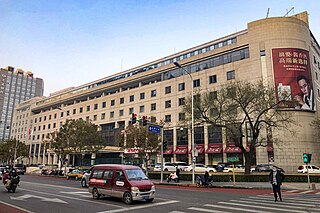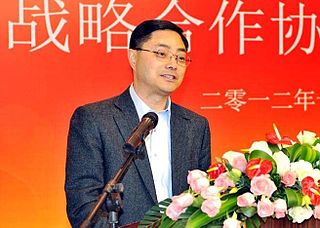Related Research Articles

The Shenzhen Stock Exchange is a stock exchange based in the city of Shenzhen, in the People's Republic of China. It is one of three stock exchanges operating independently in Mainland China, the others being the Beijing Stock Exchange and the Shanghai Stock Exchange. It is situated in the Futian district of Shenzhen. The SZSE is the world's 6th largest stock exchange with a market capitalization exceeding US$4.4 trillion in July, 2024.

The China Securities Regulatory Commission (CSRC) is a government agency directly under the State Council of the People's Republic of China. It is the main regulator of the securities industry in China.
The Stock Exchange Executive Council of the People's Republic of China was established to improve the efficiency of the securities market in mainland China.

Singapore Exchange Limited is a Singapore-based exchange conglomerate, operating equity, fixed income, currency and commodity markets. It provides a range of listing, trading, clearing, settlement, depository and data services. SGX Group is also a member of the World Federation of Exchanges and the Asian and Oceanian Stock Exchanges Federation. It is ASEAN's second largest market capitalization after Indonesia Stock Exchange at US$609.653 billion as of September 2023.

The Shanghai Stock Exchange is a stock exchange based in the city of Shanghai, China. It is one of the three stock exchanges operating independently in mainland China, the others being the Beijing Stock Exchange and the Shenzhen Stock Exchange. The Shanghai Stock Exchange is the world's third largest stock market by market capitalization exceeding $6 trillion in July 2024. It is also Asia's biggest stock exchange. Unlike the Hong Kong Stock Exchange, the Shanghai Stock Exchange is still not entirely open to foreign investors and often affected by the decisions of the central government, due to capital account controls exercised by the Chinese mainland authorities.
Founder Group (方正集团) is a major Chinese technology conglomerate that deals with information technology, pharmaceuticals, real estate, finance, and commodities trading. It is divided into five major industry groups, each covering a separate industry: PKU Founder IT Group (IT), PKU Healthcare Group, PKU Resource Group, Founder Financial (finance), and Founder Commodities. The group has been coping with bankruptcy since 2020, when the Beijing No.1 Intermediate People's Court announced the recognized leader during the restructuring.

Zhengzhou Commodity Exchange, established in 1990, is a futures exchange in Zhengzhou, one of the four futures exchanges in China. The ZCE is under the vertical management of China Securities Regulatory Commission (CSRC).
The Dalian Commodity Exchange (DCE) is a Chinese futures exchange based in Dalian, Liaoning province, China. It is a non-profit, self-regulating and membership legal entity under the China Securities Regulatory Commission (CSRC), established on February 28, 1993.
The Shanghai Futures Exchange is a futures exchange in Shanghai, China formed from the amalgamation of the national level futures exchanges of China, the Shanghai Metal Exchange, Shanghai Foodstuffs Commodity Exchange, and the Shanghai Commodity Exchange in December 1999. It is a non-profit-seeking incorporated body under the China Securities Regulatory Commission (CSRC).
The China Financial Futures Exchange (CFFEX) is a futures exchange established in Shanghai on September 8, 2006—with the approval of the State Council and the authorization of China Securities Regulatory Commission (CSRC). It is a joint venture of the Zhengzhou Commodity Exchange, Shenzhen Stock Exchange and the Shanghai Futures Exchange.

Hong Kong Mercantile Exchange was an electronic commodities exchange established in Hong Kong for the trading of commodity futures, options and other financial derivatives. The exchange was originally pitched as a platform to trade oil futures. In fact, it ended up trading mainly silver and gold futures.
Securities industry in China is an article on the securities industry in mainland China.
China Chengxin Credit Rating Group was founded in Beijing on 8 October 1992 through the incorporation of China Chengxin Credit Management Co Ltd, which is the first nationwide credit rating company of China. Subsequently, it formed subsidiaries and established branches across China, including China Chengxin International Credit Rating Company Limited. The share-holder structure of the joint venture company was changed in 2006 when Moody's came in to take over the equity positions of Fitch and the supranational institution. The company is one of the few major credit rating agencies currently operating in China.

Shanghai Free-Trade Zone, officially China (Shanghai) Pilot Free-Trade Zone, is a free-trade zone in Shanghai, China. On 22 August 2013, the State Council approved the establishment of the zone. Officially launched on 29 September 2013 with the backing of Chinese Premier Li Keqiang, it is the first free-trade zone in mainland China and covers an area of 240.2 square kilometres (92.7 sq mi). Shanghai FTZ integrates four existing bonded zones in the district of Pudong—Waigaoqiao Free Trade Zone, Waigaoqiao Free Trade Logistics Park, Yangshan Free Trade Port Area and Pudong Airport Comprehensive Free Trade Zone.
Established in 2011, the Renminbi Qualified Foreign Institutional Investor (RQFII) program is a policy initiative that allows foreign investors who hold the RQFII quota to invest directly in Mainland China’s bond and equity markets. The program represents a continued loosening of China’s capital controls and departure from its predecessor QFII. The RQFII program relaxes existing restrictions on currency settlement, adds permissible asset classes, and expands investor eligibility. The current RQFII relevant jurisdiction applies to financial organizations registered in Hong Kong, Singapore, the United Kingdom, France, Korea, Germany, Australia, Switzerland, Canada, the United States and Luxembourg.
CSC Financial Co., Ltd. trading as China Securities, is a Chinese investment bank and brokerage firm established by CITIC Securities and China Jianyin Investment in 2005 in a 60–40 ratio, as a successor of bankrupted China Securities Co., Ltd. (CSC). However, the firm now majority owned by Jianyin Investment's parent company Central Huijin Investment and an asset managing subsidiary of Beijing Municipal People's Government.
China Securities Finance Corp., Ltd. (CSF) is a Chinese state-owned financial services company founded in 2011. The company funded securities firm of China for their margin business as well as lending securities for short selling business.

The National Equities Exchange and Quotations (NEEQ) is a Chinese over-the-counter system for trading the shares of a public limited company that is not listed on either the Shenzhen Stock Exchange or Shanghai Stock Exchange. The NEEQ exchange was also nicknamed the "New Third Board" in China, as there were formerly two trading systems that the NEEQ replaced: STAQ and NET.

Zhu Yuchen, also known as Eugene Zhu, is a Chinese business executive and one of the explorers and founders of the Chinese futures market. He is the former CEO of Dalian Commodity Exchange (DCE) and China Financial Futures Exchange (CFFEX). He is also the former chairman of the China Futures Association (CFA).
References
- ↑ "History of Zhengzhou Commodity Exchange" Archived 2012-05-10 at the Wayback Machine , ZCE
- ↑ 中研普华, "2012年中国期货市场规模位居世界前列" Archived 2018-12-15 at the Wayback Machine , 中国行业研究网, 2012-8-20
- ↑ "Opportunities with the Opening of China’s Futures Market", Yahoo News, 2012-8-30
- ↑ "1st foreign-invested futures venture approved" Archived 2016-03-04 at the Wayback Machine , Sohu, 2005-12-07
- ↑ Wang Zhen, Garth Mortensen, "JP Morgan Gets Futures Foothold in China" Archived 2016-03-04 at the Wayback Machine , Caijing Magazine, 2008-1-31
- ↑ 饶红浩,"市场热议期货公司引外资", China Daily, 2012-5-16